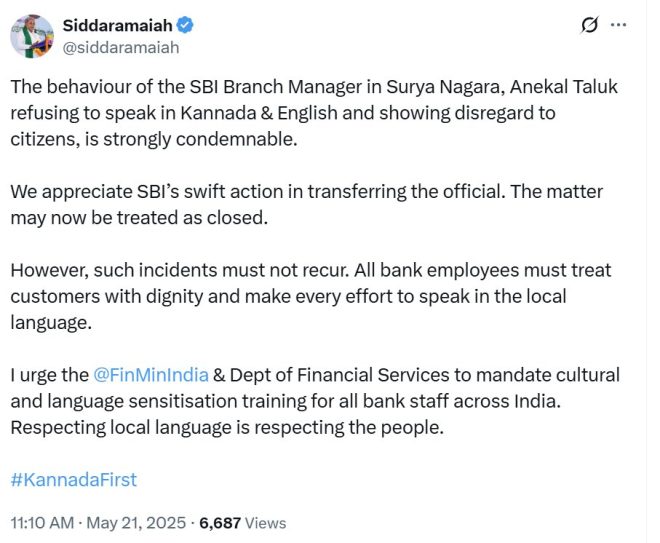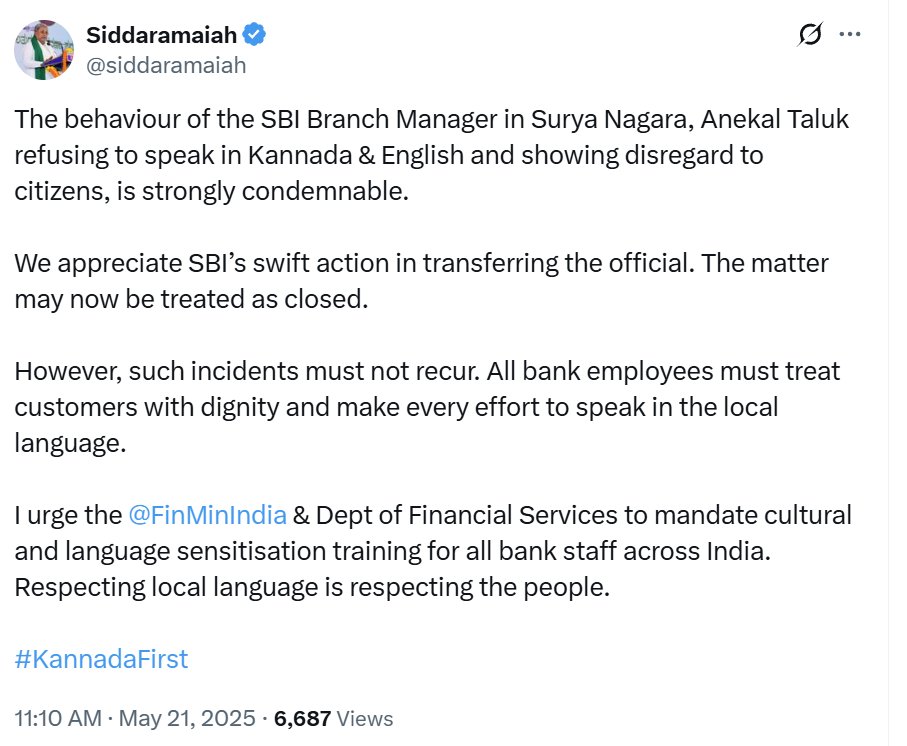
Karnataka CM Condemns SBI Branch Manager’s Disregard for Local Language
In a recent incident that has stirred significant public attention in Karnataka, Chief Minister Siddaramaiah publicly condemned the behavior of a state Bank of India (SBI) Branch Manager in Surya Nagara, Anekal Taluk. The CM’s strong remarks came after reports emerged that the bank official refused to communicate with local citizens in either Kannada or English, which raised concerns about the official’s professionalism and respect for local culture.
Importance of Language and Culture in Governance
Language plays a crucial role in effective governance and public service, especially in a linguistically diverse country like India. Kannada, the official language of Karnataka, is not just a means of communication but also a reflection of the state’s rich cultural heritage. The refusal of the SBI Branch Manager to engage with citizens in their mother tongue is seen as a significant oversight, undermining the principles of inclusivity and respect for local customs.
SBI’s Prompt Action
In response to the incident, the State Bank of India took swift action by transferring the official involved. This move has been widely appreciated by the public and the Chief Minister alike. It highlights the bank’s commitment to maintaining a standard of service that respects the linguistic preferences of its clientele. By addressing the issue promptly, SBI has demonstrated accountability and responsiveness, which are vital for building trust within the community.
- YOU MAY ALSO LIKE TO WATCH THIS TRENDING STORY ON YOUTUBE. Waverly Hills Hospital's Horror Story: The Most Haunted Room 502
Public Reaction
The public’s reaction to the Chief Minister’s tweet and SBI’s subsequent actions has been overwhelmingly positive. Many citizens took to social media platforms to express their support for the CM’s stance, emphasizing the importance of communication in one’s native language. This incident has sparked broader discussions about the necessity for public servants to be culturally sensitive and aware of the diverse linguistic landscape in India.
The Role of Social Media in Raising Awareness
The incident gained significant traction on social media, with many users sharing their experiences and opinions regarding language barriers in public services. Social media platforms have become a powerful tool for citizens to voice their concerns and hold institutions accountable. The swift response from both the Karnataka government and SBI showcases how social media can amplify issues and facilitate quick resolutions.
Promoting Local Languages in Public Services
This incident raises a critical question about the promotion of local languages in public services across India. While English and Hindi are often used in official communications, it is essential to recognize the importance of regional languages in ensuring that all citizens feel valued and understood. Encouraging the use of local languages can help bridge communication gaps and foster a more inclusive environment for everyone.
Conclusion
The controversy surrounding the SBI Branch Manager’s behavior serves as a reminder of the importance of cultural sensitivity in public service. Chief Minister Siddaramaiah’s condemnation and SBI’s quick action underline the necessity for institutions to prioritize local languages and respect citizens’ cultural identities. As discussions continue, it is crucial for government bodies and public institutions to take proactive measures to ensure that all citizens can access services in a language they are comfortable with.
In summary, the recent incident involving the SBI Branch Manager in Surya Nagara has highlighted the significance of language and cultural awareness in public service. The prompt actions taken by SBI and the support from the Karnataka government demonstrate a commitment to promoting inclusivity and respect within the community. As the conversation around language and public service evolves, it is essential for all stakeholders to work together to create an environment where every citizen feels heard and respected.

Karnataka CM Siddaramaiah tweets, “The behaviour of the SBI Branch Manager in Surya Nagara, Anekal Taluk refusing to speak in Kannada & English and showing disregard to citizens, is strongly condemnable. We appreciate SBI’s swift action in transferring the official. The matter… pic.twitter.com/fOYPGkpobM
— ANI (@ANI) May 21, 2025
Karnataka CM Siddaramaiah Tweets: A Call for Accountability
In a recent turn of events, Karnataka Chief Minister Siddaramaiah took to Twitter to express his dismay over an incident involving a branch manager at the State Bank of India (SBI) in Surya Nagara, Anekal Taluk. The tweet highlighted the branch manager’s refusal to communicate in Kannada and English, leading to a situation that many citizens found disrespectful. This incident has sparked a significant conversation around language, accessibility, and the responsibilities of public service officials.
The Incident in Detail
Karnataka CM Siddaramaiah tweeted, “The behaviour of the SBI Branch Manager in Surya Nagara, Anekal Taluk refusing to speak in Kannada & English and showing disregard to citizens, is strongly condemnable.” This tweet not only voiced the concerns of the citizens but also underscored the expectation that public officials should be responsive and respectful to the people they serve. The CM’s strong words resonated with many who felt that the branch manager’s actions were unacceptable and out of line with the values of public service.
This situation quickly escalated, leading to SBI’s prompt action to transfer the official involved. The bank’s swift response was appreciated by the CM, reflecting a commitment to upholding standards of service and addressing grievances effectively. The matter raises important questions about language accessibility in public services, particularly in a multilingual state like Karnataka.
The Importance of Language in Public Services
Language plays a crucial role in communication, especially in a diverse country like India, where multiple languages are spoken. In Karnataka, Kannada is the official language, and it is essential for government officials and public service employees to communicate effectively in the local language. When a branch manager refuses to speak in Kannada or English, it creates a barrier that can alienate citizens and hinder their access to essential services.
Public service institutions like SBI must ensure that their employees are equipped to communicate with all citizens, respecting their linguistic preferences. This incident serves as a reminder of the need for sensitivity and training in language skills for public sector employees. It’s not just about providing services; it’s about creating an inclusive environment where everyone feels valued and heard.
Public Reaction and Social Media’s Role
The incident quickly gained traction on social media, with many users expressing their opinions on the matter. Siddaramaiah’s tweet resonated with a wide audience, highlighting the power of social media in amplifying voices and holding public officials accountable. In today’s digital age, platforms like Twitter serve as essential tools for citizens to voice their concerns and demand action from their leaders.
The public’s reaction also points to a larger trend where citizens are increasingly willing to call out perceived injustices. Whether it’s a matter of language, service quality, or general respect, people are using social media to ensure their grievances are heard. This is a significant shift in the relationship between citizens and public institutions, emphasizing transparency and accountability.
SBI’s Response: A Step in the Right Direction
Following the backlash, SBI took decisive action by transferring the branch manager involved in the incident. This swift response not only addressed the immediate concern but also sent a message to other employees about the importance of respectful communication with customers. Banks and public service institutions must maintain a high standard of service, and taking corrective action in response to complaints is vital for restoring public trust.
SBI’s decision reflects an understanding of the significance of customer service and the need to uphold the dignity of all citizens. By addressing the issue promptly, the bank demonstrated its commitment to ensuring that all customers receive respectful and effective service, regardless of their language preference.
Continuing the Conversation on Access and Respect
This incident opens the door to broader discussions about language rights and accessibility in public services. It’s essential to recognize that many citizens may not be fluent in English or other languages, which can create barriers in accessing services. Public institutions should actively work towards creating an inclusive environment where language is not a barrier to service.
Furthermore, ongoing training programs for employees in public service sectors can help foster an understanding of the diverse needs of citizens. By emphasizing the importance of cultural sensitivity and effective communication, public institutions can enhance their service delivery and build stronger relationships with the communities they serve.
Conclusion: A Collective Responsibility
The incident involving the SBI branch manager in Surya Nagara serves as a stark reminder of the importance of respect, language, and accessibility in public services. Karnataka CM Siddaramaiah’s condemnation of the behavior reflects a broader sentiment among citizens who expect accountability from their public officials. As we move forward, it is crucial for all public institutions to prioritize effective communication and respect for diverse linguistic backgrounds.
The conversation sparked by this incident is vital for ensuring that all citizens feel valued and heard in their interactions with public services. By continuing to advocate for language rights and accessibility, we can work together to create a more inclusive society where everyone can access the services they need without barriers.
